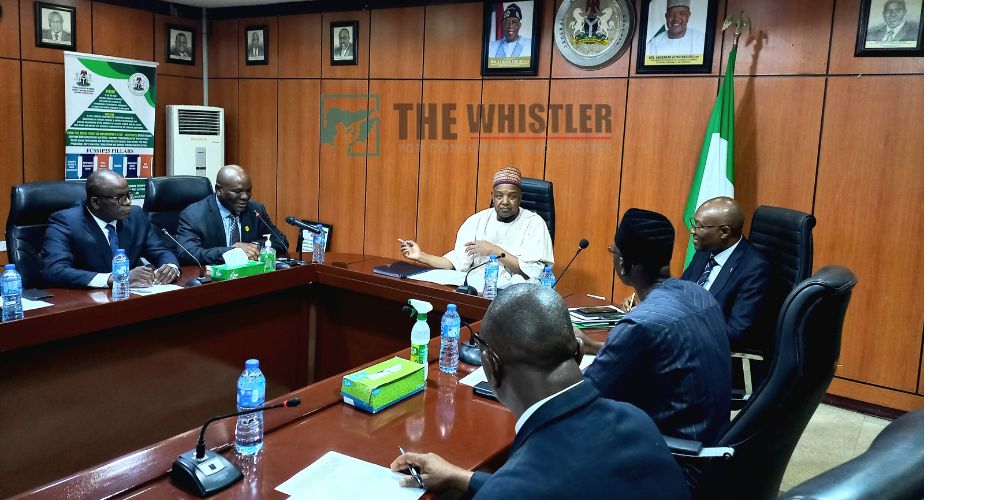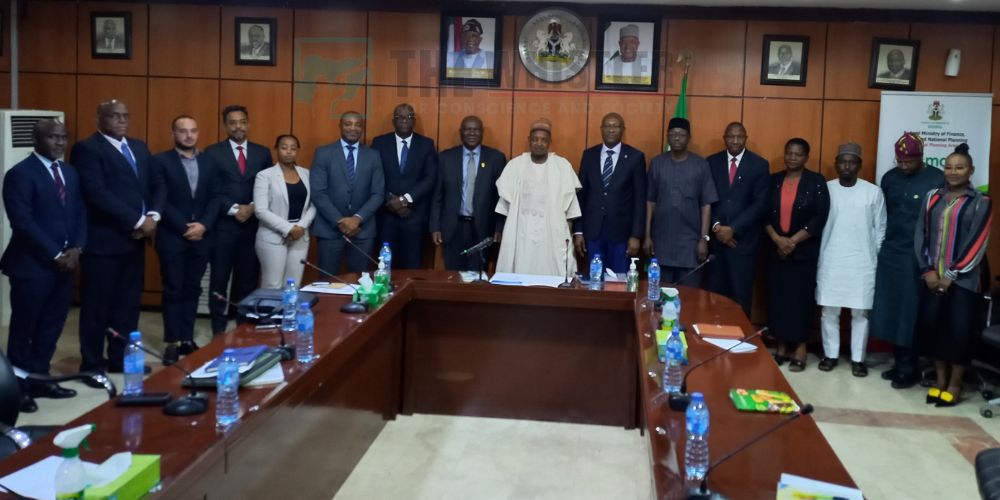Nigeria Has Achieved Success In Derisking Agric Credit— Bagudu Tells Mozambican Delegation
… As Mozambique Expresses Interest In Nigeria’s Agric-Financing Model
The Minister of Budget and Economic Planning, Atiku Bagudu has told a high-level delegation from Mozambique that Nigeria has used technology and institutions like Nigeria Incentive-Based Risk Sharing System for Agricultural Lending (NIRASAL Plc) to reduce the risks associated with agricultural lending in Africa’s biggest economy.
Advertisement
The minister also said that the various agric-lending schemes of the government like the Anchor Borrowers Programme (ABP) and the Agricultural Credit Guarantee Scheme Fund (ACGSF) have been successful despite criticisms.
The minister said this at the meeting with a high level delegation from Mozambique led by the National Director for Promotion of Commercial Agriculture, Ministry of Agriculture, Mozambique, Jaime Robert Chissico.
Other members were the representative from the country’s Central Bank, Ministry of Finance, the Policy Officer, FAO Regional Office for Africa, Mark Kofi Fynn and the Senior Private Sector Development Adviser, Private Sector and Property Lead, British High Commission, Maputo, Sergio Dista.
The delegation was part of a strategic move by the government of Mozambique funded by the Food Agriculture Organisation (FAO) to learn the financing mechanism adopted by the Nigerian government to finance agriculture.
Advertisement

Bagudu explained to the delegation the role of the Ministry of Budget and Economic Planning in funding various agricultural projects, and institutions like the Bank of Agriculture and the NIRSAL Plc.
NIRSAL is a $500m Non-Bank Financial Institution wholly-owned by the Central Bank of Nigeria (CBN) created to Redefine, Dimension, Measure, Re-Price and Share agribusiness-related credit risks in Nigeria.
According to the Minister, one of the recurring objectives of national development planning is achieving an inclusive higher rate of growth in the agricultural sector.
Bagudu said “In 2016, the world oil prices moved against Nigeria. So, the Central Bank created an Anchor Borrowers Programme, the jury is mixed out there but I think it has done well even with the challenge we faced at that moment. We saw the formation of commodity associations, self-regulatory and providing support for off-take. At some point, the commodity association borrow directly and offtake the produce.
Advertisement
“We don’t encourage the displacement of smallholder farmers. We have seen a very successful evolution of our grower model where companies have set up processing facilities and they don’t have farmlands and they rely on farmers to grow for them.
“Last week, a US-funded FID company said their rate of recovery was 99 per cent and at the heart of this is the fundamental realisation that whether it is farming or fishing, the first element is how to help them increase production.”
The minister boasted that Nigeria’s model of derisking agricultural lending has also yielded results. According to him, the introduction of technology and NIRSAL has lowered the risk of lenders participating in the various agric-lending schemes.
Bagudu said, “In the last six years, we have seen significant derisking of agric-financing using technology. It is now easy to register farmland with GIS and link them to individuals using the Bank Verification Number (BVN). This has reduced risk, particularly for the banking sector. Now bankers can even view it using drones from their head offices and this has significantly motivated lending.
“In 2015, we relied on the budget for agriculture and the facility from the Central Bank of Nigeria for the agricultural credit scheme and the Bank of Agriculture to fund farming activities. It has not been well capitalised. We introduced a derisking agency called NIRSAL. We think our experience is a country does not need to set up a purpose-built derisking institution. It just needs to recognise de-risking tools and use financial technology companies.”

Advertisement
The Mozambique delegation lead, Chissico said Nigeria plays a leading role in Africa and has achieved great success in food production despite its over 200 million population.
Chissico said, “With the help and support of FAO Mozambique, we came here to learn how our agriculture in Mozambique can be financed. We have heard about a lot of procedures and mechanisms that the government of Nigeria has in terms of supporting agriculture, especially financing agriculture.
“We do have the potential to increase the level of production of agriculture but we do not have the mechanism to finance agriculture. According to statistics, we have less than 2 per cent in terms of budget for lending basically to smallholder farmers. When you talk about the credit for agriculture, it normally goes to farmers of sugar, tobacco, cotton and cashews.”
FAO lead consultant for the project, the Chief Executive Officer of Successory Advisory, Dr. Steve Odigan mni told the minister that the delegation is looking for better financing models for agriculture in Mozambique.
According to the Successory boss, “We noted the progress Nigeria has made especially in food security, financing agriculture, smallholder farmers and inclusivity in the Nigerian agriculture and we made the specific recommendation of the progress Nigeria has made.
“In terms of South-South corporation, FAO and other stakeholders thought of the possibility of learning from the Nigerian model.”
He said the visit to understudy the Nigerian agric-financing model would help the Mozambican government to improve food security in the country.
The FAO Policy Officer for Africa, Fynn said FAO is exploiting the delegation’s visit to Nigeria to strategically achieve Sustainable Development Goal 2 which hopes to achieve “Zero hunger.”
“There is a need to increase financing for the food system. To transform the food system across the continent, it is important to have an understanding of what different countries in Africa are doing and the stages of financing the transformation of agric food system in the continent,” Fynn said.



